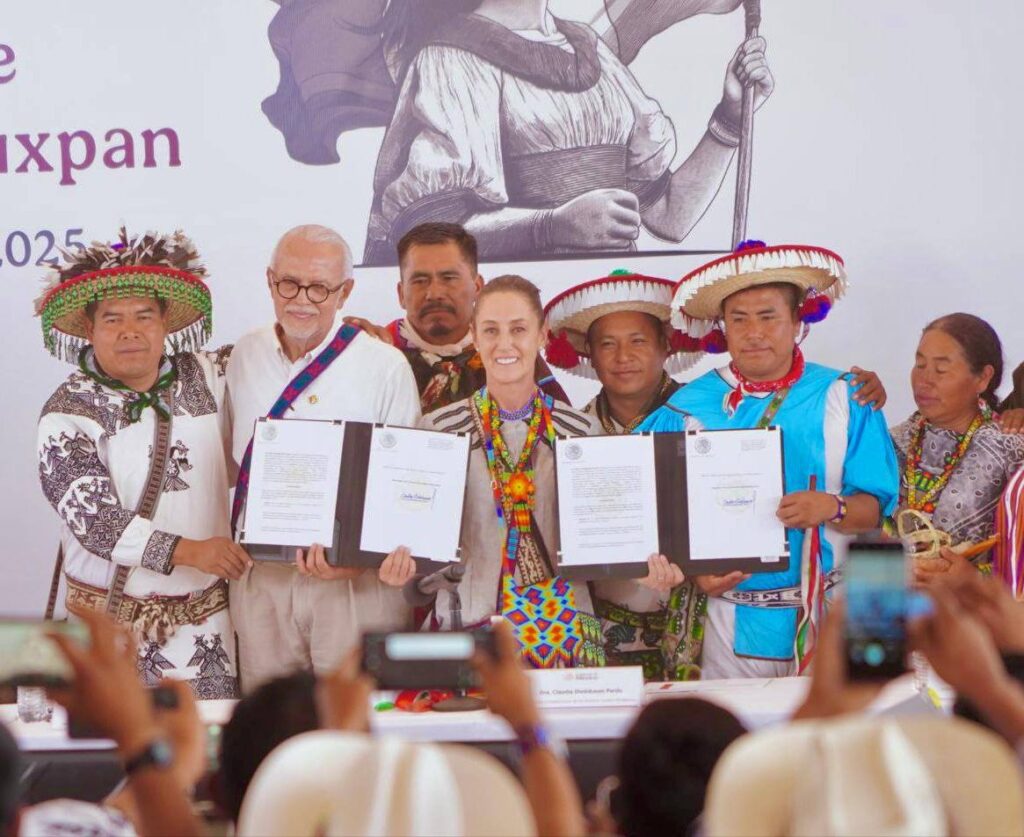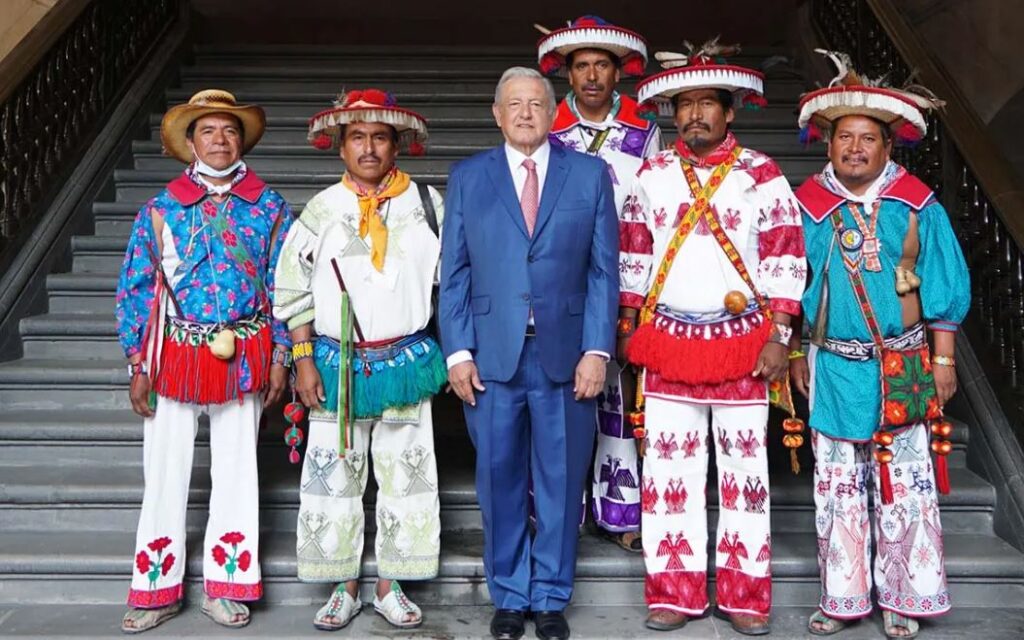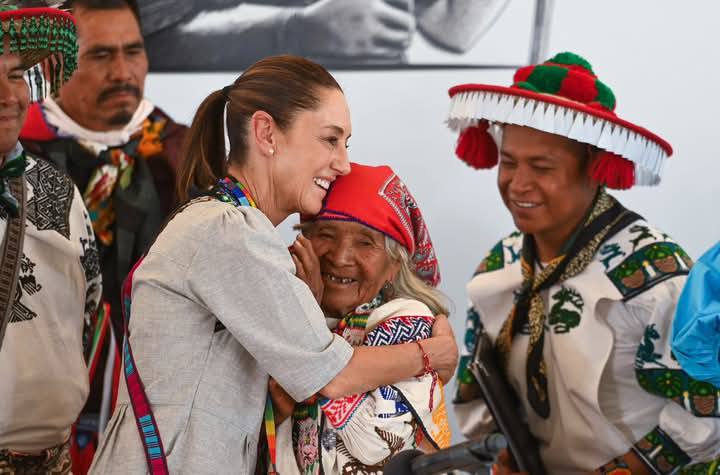Mexico’s first presidenta pledges full restitution and recognition of sacred sites as Wixárika leaders celebrate long-overdue justice in the mountains of Nayarit.
LA YESCA, Nayarit — Under a blue sky and the watchful eyes of the Sierra Madre mountains, Mexico’s first woman president made history on May 8, 2025. Claudia Sheinbaum arrived in Wixárika territory bearing news that generations had waited to hear: the restitution of more than 5,956 hectares (14,747 acres) of ancestral land to the communities of San Sebastián Teponahuaxtlán and its annex, Tuxpan de Bolaños.
It was a moment deeply symbolic — not only for what it offered materially, but for the recognition it carried.

“That’s why today, on my first visit with you, I come with something in our hands and in our hearts: we are returning 5,000 hectares to the Wixárika people that were taken from them over many periods — because this goes back to the colonial era, to the Spanish invasion, and later to many governments that failed to recognize the importance of the Indigenous peoples. Moreover, we are going to follow through on what you are asking for: the recognition of all your sacred sites,” said Sheinbaum during the ceremony in La Yesca.
—Presidencia de la República, 8 de mayo de 2025
The announcement was the latest step in the long-promised Plan de Justicia para el Pueblo Wixárika, a framework meant to resolve an enduring agrarian conflict that has simmered for more than a century. Over the past decade, the Wixárika people have won 11 court rulings confirming their ownership of more than 10,000 hectares of disputed land that the government wrongly seized and put up for sale more than 100 years ago. Still, despite the court rulings, enforcement had lagged.
The roots of the conflict trace back to the late 19th and early 20th centuries, when communal Indigenous lands were expropriated by the Mexican state under the Porfirian land reforms and later privatized during a series of questionable transactions. Much of this land was sold without the consent of the Wixárika communities, often to non-Indigenous ranchers who claimed legal ownership through state-issued titles.
Although the 1917 Mexican Constitution recognized Indigenous communal land rights, in practice these rights were frequently ignored — particularly in remote areas like the Sierra del Nayar, where enforcement was lax and political will was absent.
Throughout the 20th century, the Wixárika communities attempted to regain their land through legal and administrative petitions, but they were routinely stonewalled or denied access to justice.
In 2016, after years of legal victories with no enforcement and little support from law enforcement, members of the community took direct action by reclaiming one of the parcels that had been awarded to them by the courts. Despite facing threats from non-Indigenous ranchers who still occupied the land, they moved forward. The following year, two community leaders were assassinated in a case widely believed to be linked to the land dispute. The investigation stalled, and no one was held accountable. Years of inaction followed — until the 2022 Caravan for Dignity and Conscience, combined with mounting legal pressure, helped push the López Obrador administration to launch the Plan de Justicia and initiate the process of returning the contested land.

The government’s new allocation of 158 million pesos is intended to compensate 15 non-Indigenous ranchers currently occupying the land — an effort to ensure a peaceful and dignified transition.
For the Wixárika, this is more than a legal milestone. It’s a sacred obligation. Their ancestors have walked this land for millennia, and their identity is interwoven with the mountains, rivers, and sacred sites that dot the territory.
In 2022, hundreds of Wixárika men, women, and children set off on a nearly 1,000-kilometer journey by foot from their homeland in Jalisco to Mexico City in the Caravana por la Dignidad y la Conciencia Wixárika, demanding that the government comply with its legal obligations.
President Sheinbaum’s vow to continue restitution until 100% of the land is returned marks a turning point — one that many hope signals not just a change in policy, but a transformation in the relationship between the Mexican state and its Indigenous nations.
Misael Cruz de Haro, President of the Communal Property Commission of the Wixárika community, expressed gratitude for the government’s commitment:
“This day will be etched in our community’s memory as a historic event. Eight months into her administration, we have seen results that represent a balance between spirituality and material well-being. Under her leadership, we will continue building agreements that will influence abundance and financial prosperity to continue fulfilling the restitution of our sacred lands, because there will be no autonomy without territory.”
Misael Cruz de Haro, cited in TallaPolitica.com

- ‘Planting Is a Right’: Guadalajara’s Urban Ag Rebels Rally Against Proposed Regulations — Again - January 21, 2026
- The women who kept a Mexican pueblo above water — and stopped a megadam - January 15, 2026
- Reading the Earth: How Mexican scientists are using nature to find the disappeared - January 7, 2026
Claudia Sheinbaum land restitution Landback San Sebastián Teponahuaxtlán Wixarika